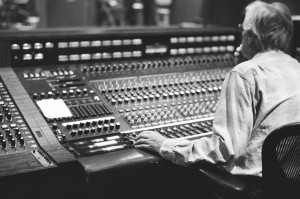Glyn Thomas Johns (born 15 February 1942) is an English musician, recording engineer and record producer.
Johns was born in Epsom, Surrey. He is the father of Ethan Johns, the older brother of Andy Johns, and uncle of Will Johns. Ethan has worked with Ryan Adams, Paul McCartney, Laura Marling, Ray LaMontagne and Kings of Leon, while Andy has worked with The Rolling Stones, Led Zeppelin and Jimi Hendrix, either on his own or under the tutelage of Eddie Kramer.
Johns has worked with such artists as Led Zeppelin, The Rolling Stones, The Who, Eagles, Bob Dylan, Linda Ronstadt, The Band, Eric Clapton, The Clash, The Beatles (“Get Back” Sessions), Ryan Adams, The Steve Miller Band, Small Faces, Spooky Tooth, The Easybeats, The Ozark Mountain Daredevils, Blue Öyster Cult, Emmylou Harris, Midnight Oil, New Model Army, Belly, Joe Satriani, Ronnie Lane, Rod Stewart with Faces (band), John Hiatt, Joan Armatrading, Buckacre, Gallagher and Lyle, Georgie Fame, Family, Helen Watson, Fairport Convention, Humble Pie, and many others.[3]
In the 1960s, while associated with the UK rock band The Presidents, Johns began working as a recording studio engineer at IBC Studios in Portland Place, London and was able to take the band in during weekends and try his skills at production and recording. The presidents was his first true production work and in 1969, Johns was called upon to rescue the troublesome Get Back sessions for The Beatles. Johns compiled several versions of the album, which were all rejected by the band, before the project was eventually turned over to producer Phil Spector. Spector’s version became the released album, which was retitled Let It Be which Glyn called “a load of garbage.”
In 1971, he recorded and mixed The Who‘s Who’s Next. His influence on The Faces‘ 1972 album A Nod Is as Good as a Wink… to a Blind Horse, which he co-produced with the band, can be gauged from the message that follows the credits: ‘Thank you Glyn, you made all the difference’. Johns produced the first two albums by the Eagles. Though they were successful, the band—especially Glenn Frey—clashed with Johns over the direction of their sound. After recording two songs for their third album (including their first #1 single “Best of My Love“), they dismissed Johns and returned to California to finish the album. Johns’ output slowed down in the mid 1980s, although he undertook work with Midnight Oil, Nanci Griffith, and Belly.
Johns also produced the 1977 Eric Clapton album Slowhand, including the popular hit “Wonderful Tonight“, written by Eric Clapton.
In 2011, after a couple of decades spent largely away from production, Johns worked with Ryan Adams on his album, Ashes & Fire. In February 2012, Johns began work on the Band of Horses album, Mirage Rock. In a nod to Johns’ work with the Faces, the credits contain the note: “Thanks to difference, you made all the Glyn.”
Glyn Johns and Eric Clapton have collaborated once again for Clapton’s 2016 release I Still Do, Clapton’s twenty-third album.
Johns developed a unique approach to the recording of drums, known as the “Glyn Johns Method”, by rarely using more than two or three microphones, keeping usually two overhead, but in an unusual overhead arrangement, as to achieve natural perspective. The key to the method is to keep both overhead mics equidistant from the centre of the snare.
Visit site: Http://GlynJohns.com



